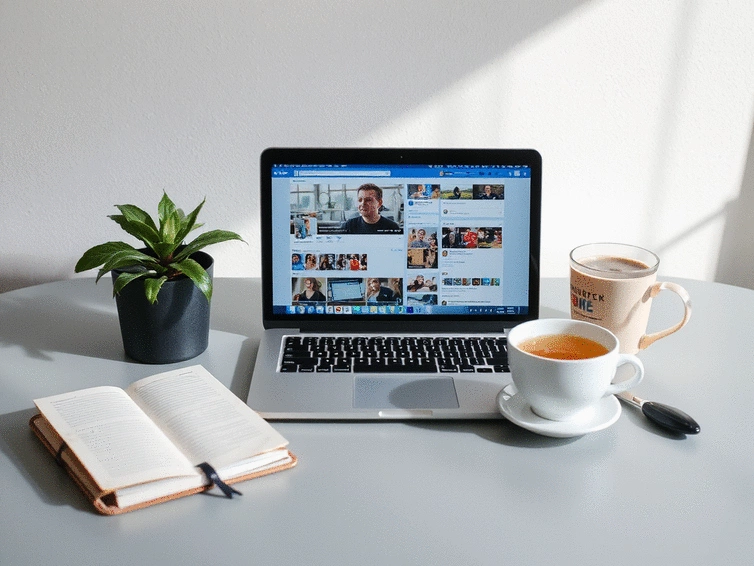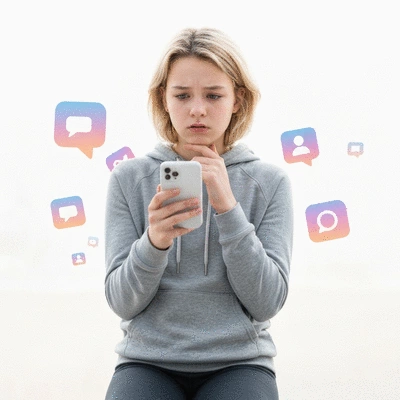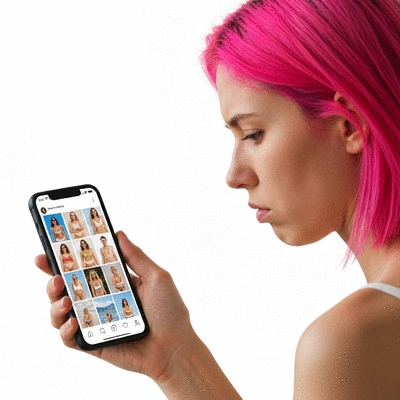
Social Media's Impact on Well-being
As the digital landscape evolves, the nuances of social media's impact on mental health become increasingly apparent. What if your next scroll could influence your well-being? Understanding the relationship between social media and mental health is not just important—it's essential for maintaining a balanced life in the digital age.
What You Will Learn
- Social media can foster connections, offering support and community but also leading to anxiety through constant comparison.
- Teens face unique pressures on social media that can exacerbate feelings of inadequacy and mental health issues.
- Influencers may set unrealistic standards, impacting self-esteem and mental health among their followers.
- Understanding gender differences in social media's impact is crucial for supporting adolescents' mental health.
- Recognizing social comparison as a significant factor can help build a healthier relationship with social media.
- Implementing boundaries around social media use is essential for better sleep and productivity.
- Strategies for healthy engagement include setting time limits and encouraging positive content curation.
- Policy recommendations can create safer online environments, facilitating mental health education and resources.
Impact of Social Media on Mental Well-being
This visual explores the dual impact of social media, highlighting both its benefits and challenges, particularly concerning mental health.
The Complex Relationship Between Social Media and Mental Well-being
As we navigate our modern world, the role of social media in our daily lives has become increasingly significant. It's fascinating to see how these platforms can foster connections among people from all walks of life. However, they can also contribute to feelings of anxiety and depression, leading to a complex relationship that many of us grapple with. Let's explore both sides of this coin!
On one hand, social media can help us connect with friends, family, and communities that share our interests. These connections can provide a sense of belonging and support. On the other hand, the constant comparison and pressure to maintain a perfect online image can lead to feelings of inadequacy. This duality is crucial to understand as we assess our mental well-being in the digital age.
Understanding the Positive and Negative Impacts
- Positive impacts: Social media can strengthen relationships and provide platforms for expression.
- Negative impacts: It can heighten anxiety and depression through constant comparisons.
- Balancing act: Recognizing when to disconnect is vital for mental health.
It's essential to reflect on how these elements impact our daily lives. By finding a balance between engagement and disengagement, we can navigate social media in a way that uplifts rather than drains us. At iFit Magazine, we believe in the power of healthy online interactions to promote overall wellness!
The Role of Social Media Platforms in the Lives of Teens
Teens today are more connected than ever, with social media playing a pivotal role in their social lives. However, studies show that this constant connectivity can come with a price. For example, a report from the U.S. Surgeon General highlights that many adolescents experience increased symptoms of depression and anxiety, often linked to their social media use.

As parents and mentors, it's crucial to be aware of these trends and encourage open conversations about online experiences. By understanding the pressures teens face, we can better support them in navigating this challenging landscape.
Influencer Impact on Psychological Well-being
Influencers have become a dominant force in shaping perceptions of self-esteem and mental health, particularly among young audiences. Their carefully curated lives can create unrealistic standards that affect how followers view themselves. This phenomenon can lead to diminished self-worth and increased mental health issues, as detailed in research like the study published in the Journal of Medical Internet Research, which explores the impact of social media influencers on mental health.
It's vital to remember that while influencers can inspire, they can also unintentionally set a precedent that may be harmful. Encouraging a critical approach to the content we consume can help mitigate these effects.
Emotional and Psychological Effects of Social Media Use
Gender Differences in Social Media Impact
Interestingly, research indicates that boys and girls experience the effects of social media differently. For girls, the pressures of maintaining a flawless appearance online can lead to heightened vulnerability regarding body image and self-esteem. Boys, on the other hand, may face different challenges, such as the pressure to conform to traditional masculine ideals. Understanding these gender-specific impacts is crucial for developing targeted interventions and support systems, as discussed in various studies, including those summarized by the National Institutes of Health.
Understanding these differences is essential for fostering healthy discussions about the impact of social media on mental health, especially among young people.
Social Comparison Theory and Its Connection to Mental Health
Social comparison theory suggests that we determine our self-worth by comparing ourselves to others. In the world of social media, this dynamic is intensified, as we are constantly bombarded with curated images that portray seemingly perfect lives. The psychological consequences of this can be profound, affecting self-esteem and body image for many.

Recognizing the impact of these comparisons is the first step towards building a healthier relationship with social media. Together, we can encourage each other to focus less on comparison and more on self-acceptance.
Sleep Disruption and Productivity Loss Linked to Social Media Addiction
Have you ever found yourself scrolling through your feed late into the night? You're not alone! Many people struggle with sleep disruption due to social media addiction, which can significantly affect academic performance and overall productivity. The blue light emitted from screens can hinder our ability to fall asleep, creating a cycle of fatigue and decreased focus.
To combat this, establishing healthy boundaries around social media use, especially before bedtime, is crucial for maintaining both mental health and productivity.
Interactive Poll: Your Experience with Social Media
How does social media impact your mental well-being? We'd love to hear your thoughts! Please choose one of the following options:
Strategies for Healthy Social Media Engagement
In today's digital age, fostering healthy social media habits is more crucial than ever. Social media can be a powerful tool for connection and support, but it also poses risks to mental well-being. As a wellness advocate, I believe we can take actionable steps to create a positive online experience for ourselves and our loved ones. Here are some practical tips for parents, educators, and teens to enhance digital well-being:
- Set specific time limits for social media use to prevent unhealthy scrolling habits.
- Encourage open conversations about online experiences to promote emotional sharing.
- Teach teens to curate their feeds by following accounts that inspire positivity and growth.
- Model healthy social media behavior by practicing mindfulness and digital detoxes.
By implementing these strategies, we can create a more balanced approach to social media, emphasizing its potential for fostering resilience and community among users.
Frequently Asked Questions (FAQs)
Q1: How can social media positively impact mental health?
Social media can foster connections, strengthen community bonds, provide platforms for self-expression, and offer emotional support, contributing to a sense of belonging.
Q2: What are the main negative impacts of social media on mental health?
Negative impacts include heightened anxiety and depression symptoms, constant comparison leading to feelings of inadequacy, and pressure to maintain a perfect online image.
Q3: Why are teens particularly vulnerable to the negative effects of social media?
Teens face unique pressures, including increased depression linked to constant connectivity and heightened vulnerability to body image issues, especially among girls, as well as the influence of unrealistic standards set by influencers.
Q4: How do influencers affect their followers' psychological well-being?
Influencers often present carefully curated lives that can create unrealistic standards, leading to diminished self-worth and increased mental health issues among their followers.
Q5: What is social comparison theory, and how does it relate to social media?
Social comparison theory suggests individuals evaluate themselves by comparing themselves to others. On social media, this is intensified by constant exposure to curated, seemingly perfect lives, which can negatively impact self-esteem and body image.
Q6: What strategies can promote healthy social media engagement?
Strategies include setting specific time limits, encouraging open conversations about online experiences, curating feeds with positive content, and modeling healthy social media behavior through mindfulness and digital detoxes.
Q7: What are some policy recommendations for creating safer online environments?
Policy recommendations include implementing digital literacy programs in schools, encouraging social media companies to develop features that promote positive interactions, supporting research on social media's psychological effects, and advocating for mental health resources and training for educators.
Policy Recommendations for Safer Online Spaces and Mental Health Education
Creating safer online environments is essential for protecting mental health, especially among vulnerable populations. As someone passionate about fitness and wellness, I recognize the importance of policies that support mental health education in schools and communities. Here are some recommendations that can help mitigate the negative impacts of social media:
- Implement digital literacy programs in schools that teach students about safe online practices and the effects of social media on mental health.
- Encourage social media companies to develop features that promote positive interactions, such as tools for reporting harmful content and cyberbullying.
- Support research initiatives that study the psychological effects of social media usage to inform future policies and regulations.
- Advocate for mental health resources and training for educators to support students facing online challenges.
These policy recommendations can help create a safer online landscape, encouraging healthier engagement with social media and fostering mental well-being.
Recap of Key Points
Here is a quick recap of the important points discussed in the article:
- Positive Impacts: Social media can strengthen relationships and provide platforms for expression.
- Negative Impacts: It can heighten anxiety and depression through constant comparisons.
- Balancing Act: Recognizing when to disconnect is vital for mental health.
- Open Conversations: Encouraging discussions about online experiences can promote emotional sharing, especially among teens.
- Curate Feeds: Following accounts that inspire positivity and growth can enhance online experiences.
- Healthy Boundaries: Establishing limits on social media use, especially before bedtime, is crucial for maintaining mental well-being and productivity.
- Policy Recommendations: Supporting digital literacy and mental health education can create safer online environments.






Positive Impacts: Connection & Support
Negative Impacts: Anxiety & Comparison
Specific Challenges & Vulnerable Groups
Behavioral Impacts & Solutions